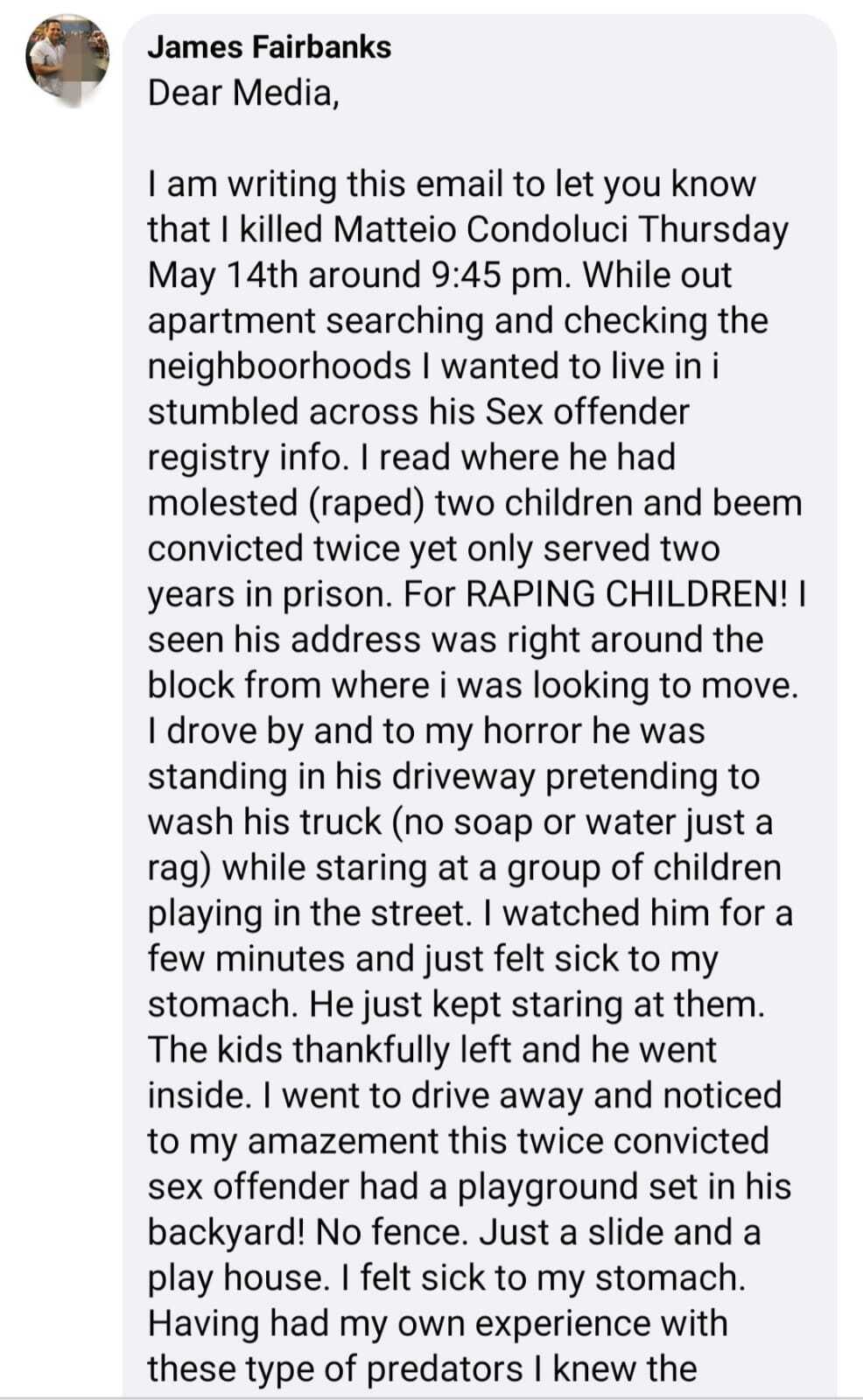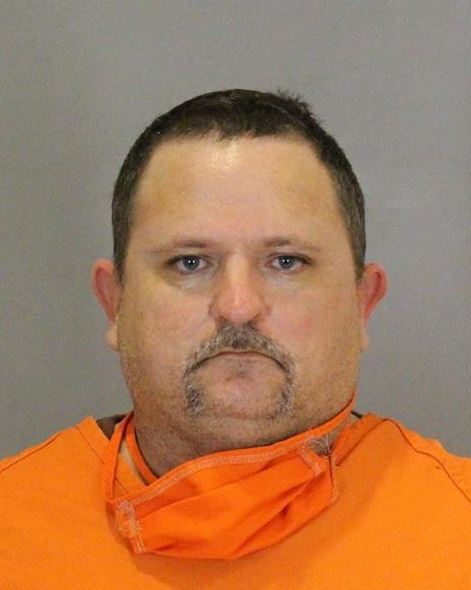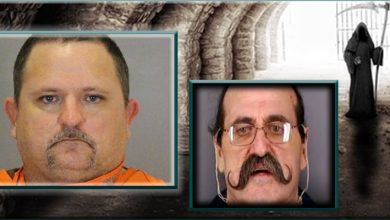Public School Employee Confesses on Facebook to Killing Pedophile, Gets Arrested
Vigilante Justice in Omaha, Nebraska: The James Fairbanks Case

In May 2020, a shocking case of vigilante justice unfolded in Omaha, Nebraska, when public school employee James Fairbanks, a former school teacher, took matters into his own hands by shooting and killing Mattieo Condoluci, a twice-convicted child sex offender. The case gained widespread attention after Fairbanks publicly confessed to the killing in an email sent to local media outlets, setting off a contentious debate about justice, child protection, and the limits of the legal system.
The Confession and Arrest
James Fairbanks, 44, sent an email to KETV Newswatch 7 in 2020, admitting to shooting Mattieo Condoluci. In this remarkable confession, Fairbanks detailed how he had killed the 64-year-old Condoluci at his home near 43rd and Pinkney Streets in Omaha. After the public confession, Fairbanks was arrested on Tuesday, May 19, 2020, and charged with criminal homicide in connection with Condoluci’s death.

Who Was Mattieo Condoluci?
Mattieo Condoluci, 64, was a twice-convicted child sex offender living in Omaha at the time of his death. His criminal history included serious offenses against children, which had left lasting trauma for his victims and their families.
Condoluci’s own daughter has spoken out about the years of abuse she suffered at his hands. In an interview with KMTV, she shared details of her traumatic past, revealing the true nature of the man her father was. This testimony provides a troubling glimpse into Condoluci’s character and suggests a pattern of abusive behavior that extended beyond his criminal convictions.
One particularly vocal critic of Condoluci has been Laura Smith, whose 5-year-old son was one of his victims over two decades ago. For more than 20 years, Smith had been fighting for justice against Condoluci, who had sexually assaulted her young child. Her experience with the justice system and its perceived failure to adequately protect children from Condoluci would later lead her to become an unlikely advocate for the man who killed him.

Fairbanks’ Motivation
According to his own statements and those of his ex-wife, Fairbanks’ actions were motivated by a desire to protect neighborhood children from a potential predator. Kelly Tamayo, Fairbanks’ ex-wife, stated that Fairbanks first learned Condoluci was a sex offender while searching for a home in the neighborhood. This discovery apparently triggered deep concerns in Fairbanks about the safety of children in the area.
In a wide-ranging interview with The World-Herald after his arrest, Fairbanks maintained that killing Condoluci was “justified” and expressed doubt that a jury would convict him for his actions. He positioned his actions as necessary protection for vulnerable children who might have become Condoluci’s next victims.
Fairbanks claimed that he wanted to stop Condoluci, a twice-convicted child sex offender, from victimizing more children. His background as a school paraprofessional, working with children on a daily basis, may have heightened his concerns about child safety, though this doesn’t justify his taking the law into his own hands.


Unusual Public Support
One of the most remarkable aspects of this case was the public support Fairbanks received from unexpected quarters. Laura Smith, the mother of one of Condoluci’s victims, became an outspoken advocate for Fairbanks’ freedom. As reported by The Daily Beast, Smith fought to free the man who killed her son’s molester, viewing Fairbanks’ actions as delivering the justice that the legal system had failed to provide.
Even more surprisingly, Condoluci’s own daughter supported Fairbanks. She publicly backed the Omaha man accused of killing her father, demonstrating the complex emotions that can arise in cases involving long-term sexual abuse. Her support for her father’s killer speaks volumes about the pain she experienced and her desire to see no more children harmed by him.

Legal Proceedings and Outcome
Despite his initial claims that he would fight the charges and that a jury would understand his actions, Fairbanks ultimately decided not to contest the case. In April 2021, he pleaded “no contest” to second-degree murder and use of a weapon to commit a felony . A “no contest” plea means that while not admitting guilt, the defendant accepts the punishment for the crime.
After accepting this plea bargain, Fairbanks was sentenced in July 2021 to 40-70 years in prison for the vigilante killing. Under Nebraska sentencing guidelines, this means he must serve at least 20 years before becoming eligible for parole.
The Complex Ethics of Vigilante Justice
The Fairbanks case highlights the complicated ethical questions surrounding vigilante justice. While many can understand the impulse to protect children from known predators, our justice system is founded on principles that reject taking the law into one’s own hands.
Prosecutors in the case maintained that regardless of Condoluci’s past crimes, vigilante justice cannot be tolerated in a society governed by rule of law. They argued that allowing citizens to act as judge, jury, and executioner based on their own moral judgments would undermine the entire justice system.
Yet the case also exposed the deep frustrations many feel about how society handles convicted sex offenders after they’ve served their sentences. Laura Smith’s decades-long fight for justice and her eventual support of Fairbanks reveals how victims and their families can feel abandoned by a system they see as inadequate in protecting the most vulnerable.
Conclusion
The case of James Fairbanks and Mattieo Condoluci represents a tragic intersection of justice, vengeance, and child protection. While Condoluci’s criminal history and the testimony of his victims, including his own daughter, paint a picture of a man who caused immense harm, Fairbanks’ decision to take justice into his own hands led to his own lengthy incarceration.
The unusual support Fairbanks received from victims of Condoluci, including Condoluci’s daughter and the mother of another victim, demonstrates the complex emotions that surround cases involving sexual abuse of children. These supporters viewed Fairbanks not as a murderer but as someone who prevented future victims by stopping a predator they believed would continue to harm children if given the opportunity.
Nevertheless, the legal system maintained its position that vigilante justice cannot be condoned, regardless of the victim’s history or the perpetrator’s motivations. Fairbanks is now serving a lengthy sentence for his actions, a reminder that despite public sympathy in some quarters, taking the law into one’s own hands carries severe consequences.
The case continues to resonate as a stark example of what can happen when citizens lose faith in the justice system’s ability to protect the most vulnerable members of society, while simultaneously demonstrating why that system insists on handling justice through established legal channels rather than individual action.






What is with people shoot, shovel, and shut up .
Let me get this straight, the man did the systems job because the system is broken, that’s my understanding
I would give him the keys to the city.
Billy McKay agreed
Lets start him a go fund me fk that he shouldn’t have to pay the price for doin what needed to be done
Doin the real cleanup